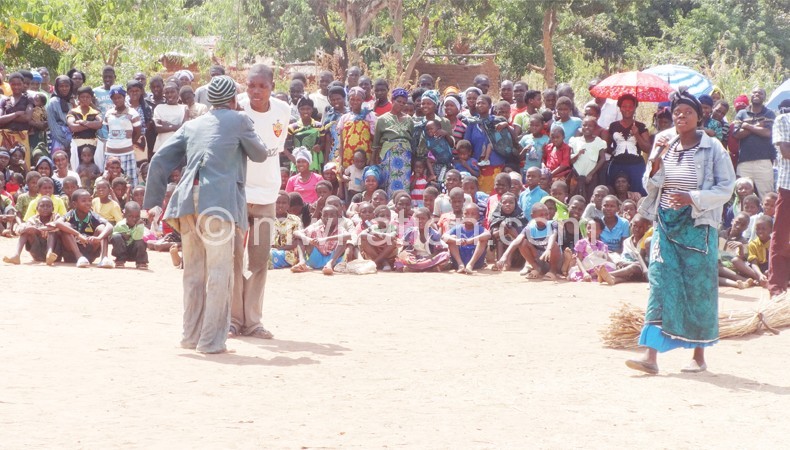Sacrificing daughters’ futures for wealth

disseminate information on effects
of overpopulation
At 24, Prisca Master is already a mother of three, who has been living alone for two years, following her husband’s migration to South Africa in 2012.
Prisca comes from Kapeta Village in Traditional Authority (T/A) Nyambi, Machinga. She married at 16 after dropping out of Standard Four in 2006.
“My parents used to tell me I would enjoy life once married. But I have discovered that the opposite is true, especially when a woman is not economically empowered,” she narrates.
Prisca says she struggles to provide for her children as their father does not support the faily financially.
“I don’t know what my husband is thinking, but life is very tough for me. I wish I returned to school,” she says.
Prisca is among thousands of girls forced into early marriages in Machinga. Many of them become wives at as early as 12-years-old, often to much older men.
According to the United States Agency for International Development (Usaid), one in every four teenagers— 25 percent—is pregnant or starts bearing children in Malawi.
Usaid maternal, newborn and child health specialist, Evelyn Zimba, says a research called youth friendly health services assessment by the Ministry of Health conducted early this year established that half of the girls aged between 10-24 have sex at their most tender ages.
Zimba says this contributes to adolescent pregnancies which, in turn, leads to uncontrollable population growth.
She notes that most adolescents do not know how to avoid pregnancy and/or are unable to obtain contraceptives.
“Youth lack information on sexual and reproductive health services. In cases of sexual abuse, violence and coercion, girls lack guidelines,” she explains.
But Zimba warns that young girls who have not fully developed physically risk obstructed labour resulting in fistula or death of both the new-born baby and mother.
“When girls are educated, they are likely to delay the birth of their first child, are more knowledgeable about health issues, they and their children live longer. They are more likely to use contraceptives and have fewer children, lowering the risk of death during childbirth.
“These girls are more likely to grow up to be economically empowered and bolster their families’ livelihoods,” she explains.
Senior Chief Nyambi acknowledges that Machinga is among districts that have tolerated child marriages for too long, because of a host of ill-conceived justifications and arguments.
The chief says some social, cultural, religious and traditional beliefs fuel child marriages.
“With too many families living in poverty, child marriage is a source of income and, therefore, an economic survival strategy,” he explains.
Minister of Gender, Child Welfare and Community Development Patricia Kaliati concurs with Zimba and Nyambi.
“No society should entertain child marriages and teir effects which include waste of talent and exploitation of children,” she said.
Country director for Health Policy Project (HPP)— family planning, sexual and reproductive health rights campaigners— Olive Mtema says child marriages is a human rights and public health issue, which cannot be left unchallenged.
Mtema also says child marriage violate the Convention on the Rights of the Child and the African Charter on the Rights and Welfare of the Child.
She calls on government, civil society organisations (CSOs), community leaders and families to consider promulgating, enforcing and building community support for laws on the minimum age of marriage.
“HPP believes ending child marriage would help protect girls’ rights and reduce adolescent pregnancies. Therefore, our goal as a nation should be to achieve zero tolerance to child marriage by enacting laws that ban child marriage,” she says.
On her part, Prisca proposes a deliberate policy targeting parents who may wish to re-enrol in schools.
“I’m one of the parents who wish to return to school, but fear my presence among minors may distract them in class. Perhaps separate classrooms could be built to accommodate us,” she says.





